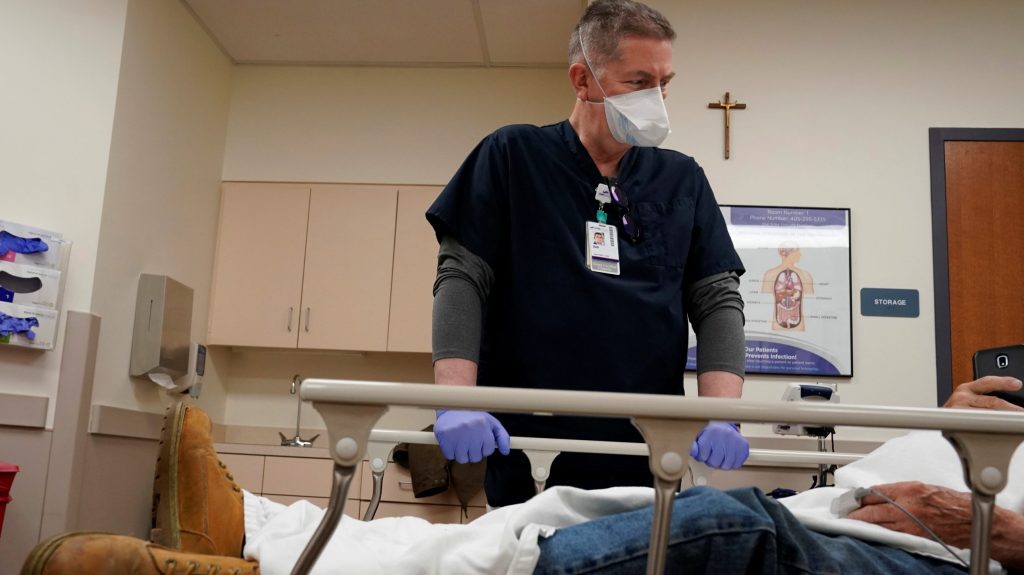With local hospitals tightening restrictions for entering the rooms of patients with COVID-19, Auxiliary Bishop Andrew H. Cozzens of St. Paul and Minneapolis is addressing an important pastoral need -- administering the sacrament of the anointing of the sick to those suffering from the illness who are in danger of dying.
Chaplains at many local hospitals are now prohibited from entering rooms to see patients and instead must minister by phone or video camera. Bishop Cozzens is putting together a team of about a dozen priests to anoint patients with sacramental oil.
Bishop Cozzens said April 28 that the team, called the Anointing Corps, was scheduled to have two training sessions, one online and the other in person, presented by Catholic medical professionals who would outline safety procedures and protocols. Immediately after training is completed, the priests will be put on call to visit patients in their homes, at local hospitals and in nursing homes.
Parishes will be the first point of contact for anointing requests and they will pass along information to medical specialists who will determine who meets the criteria for receiving the sacrament, meaning the person is sick enough to need anointing right away. Then, those specialists will contact one of the priests to visit the patient in person. All priests serving in this ministry are under 50 and most are parochial vicars, meaning they are not serving as pastors. More than 30 stepped forward to volunteer.
"Our priests have already been getting some anointing requests from people who are seriously ill because of COVID," Bishop Cozzens said. "We plan to use these priests to anoint people wherever they are."
As they move forward in this ministry, the priests will quarantine themselves, either alone or with other priests on the team, and will pull back from parish ministry. In some cases, they will temporarily change residences.
One of the issues will be navigating the restrictions that are in place at hospitals and care facilities. Bishop Cozzens said he is talking with priests now serving as chaplains at those facilities to determine the best way to proceed.
"We will do our best to work with individual hospitals and their policies," Bishop Cozzens said, "with in mind this deep concern that the church always has, that those who are in danger of death could receive the sacraments. So, we will always do our best to try to do that to the extent that we are allowed."
Like government leaders and health officials, Bishop Cozzens said he is trying to gear up for an increase in the number of COVID-19 patients in the coming weeks and months, which is why he is trying to deploy the chaplains now.
"That's the reason we're taking this so systematically and seriously, because we want to be prepared for the need, should it increase exponentially or dramatically," he said. "If you will, we're training the volunteer fire department. These guys are going to be ready to go in case things get bad."
For guidance, Bishop Cozzens said he looked to the Archdiocese of Chicago, which is "a few weeks ahead of us," he said.
"They already have 30 priests trained. Of course, they're much larger than us," he said. "And, they've developed some really excellent protocols to help the priests. So, we have modeled our system on that."
He noted that the priests' visit also can include the sacraments of Communion and reconciliation -- which, with the anointing, are known as last rites -- which he said is a general practice that will be applied here as well. It's all part of an urgent attempt to help people who are quarantined when they have COVID-19 and can't even have family members in the room with them, even when they are gravely ill.
"It's certainly true that one of the most painful things about this disease is that people who have it get isolated, and some of them are dying alone," he said. "That's a very sad reality. And so, if it's possible that our priests could come and alleviate that and bring the presence of Jesus so that people know they're not alone, that would be a really important thing, because we certainly want these people to know they are not alone. None of us are alone at the time of death."
He said that the Hail Mary is a good way of bringing home that point, with the last line ending with, "Holy Mary, mother of God, pray for us sinners, now and at the hour of our death."
"Mary and Jesus will answer that, and be present at that moment," he said. "If we can help remind people of that through the presence of a priest, we certainly want to do that."

